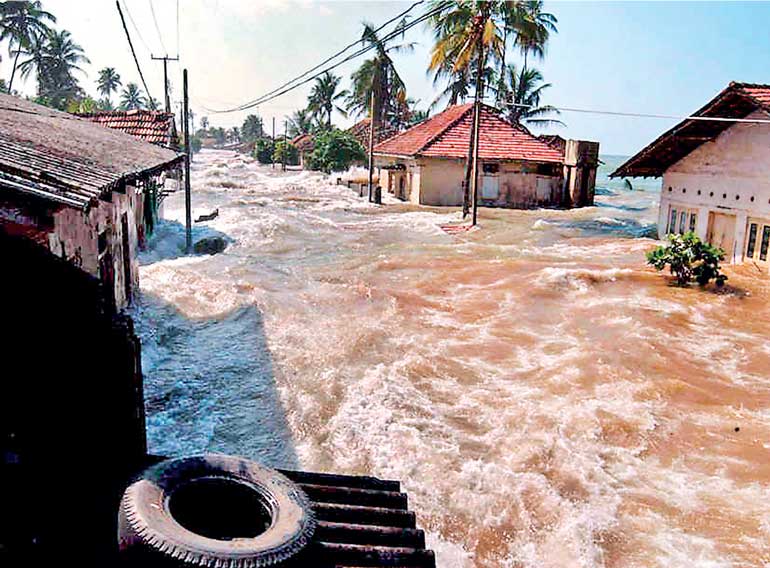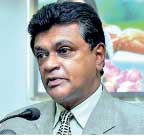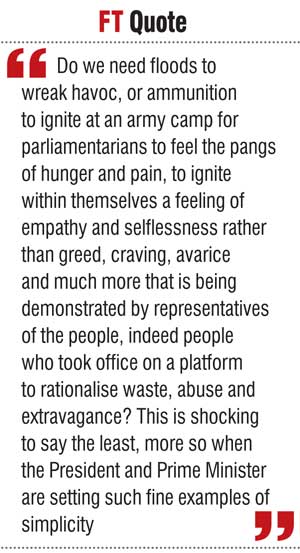Monday Feb 16, 2026
Monday Feb 16, 2026
Monday, 20 June 2016 00:00 - - {{hitsCtrl.values.hits}}

The 2004 Boxing Day tsunami revealed the country’s dire need to formulate an appropriate national response to natural disasters
 By Ranel Wijesinha
By Ranel Wijesinha
On 27 December 2004, a day after the devastating tsunami engulfed part of the nation, I recall releasing a statement to the media, which I located today. I invested time to locate it, rather than reinvent a thought that I had already expressed in the media, given that I have been observing with considerable dismay, the irresponsible distraction of the time of the President and Prime Minister, arising inter alia, from the near importation of super luxury vehicles for parliamentarians.
Deriving a thought from the term ‘Irrational Exuberance’ which Alan Greenspan coined during the dot-com bubble, I would like to share a term I coined to describe a phenomenon among our parliamentarians. That term is ‘Unconscionable Avarice’.
Given that I am referring to certain members of the ‘House’, I am hopeful that the Honourable Speaker, Deshamanya Karu Jayasuriya, who I have known and known well for over 26 years, will not fault me for exercising my freedom of expression, a freedom, indeed a robust pillar of the incumbent Government, which is often taken for granted today by most in the country.
 Regaining credibility and dignity, amidst disunity is commendable
Regaining credibility and dignity, amidst disunity is commendable
We all recognise that, compared to the environment which prevailed as at the first week in January 2015, there clearly is an almost 180 degree turn for the better, with regard to the environment of freedom of expression and association, freedom of print and electronic media, a nation and a leadership, that is globally respected and so on.
Individual liberties and freedoms, self-respect and dignity have been restored. I admire the many steps that have been tirelessly taken to regain credibility as a nation, despite the constraints of a multi-party Government of ‘national-unity’, side by side with the irritants and distractions of a less than responsible Opposition. Every citizen can take pride in and will be grateful for this priceless achievement, accomplished within 2015, itself.
Devastation and lack of preparedness is not without precedent
My dismay stems from the fact that a Government, which has achieved much, is being distracted far too frequently. Certain distractions are avoidable, while others require far superior management.
As for the recent devastation, and the lack of preparedness, both are not without precedent. Not only just 11 years ago, but we had floods and displacements before and after, except that the degree of devastation is unprecedented, if we take a recent timeframe of say two decades.
Nevertheless, as I articulated in a three-part series in the print media in 2010, after the then rains and floods, we could have mitigated or minimised the risk. I intend to republish this series shortly, if only to build awareness and to encourage further action.
Is not the debt burden reason enough to be responsible?
Do we need floods to wreak havoc, or ammunition to ignite at an army camp for parliamentarians to feel the pangs of hunger and pain, to ignite within themselves a feeling of empathy and selflessness rather than greed, craving, avarice and much more that is being demonstrated by representatives of the people, indeed people who took office on a platform to rationalise waste, abuse and extravagance? This is shocking to say the least, more so when the President and Prime Minister are setting such fine examples of simplicity.
I think we should stop the party’
The caption in quotes, ‘Coalition of stakeholders to respond to national disaster needed’ is the headline to the statement I issued to the print media close to midnight on 27 December 2004, the day after the tsunami.
I was a regular contributor to the print and electronic media and rapidly penned and emailed these thoughts to Editors who I knew well. It was published the next day, 28 December. I said then that “I think we should stop the party” as it were on December 31st.
Partnering with the displaced, devastated and homeless
Having said we should stop the party as it were I said: “Instead we should roll up our sleeves, get our hands dirty and feet wet and partner with the displaced, devastated and homeless people of the North East and the South. These are only a few thoughts but we must engage ourselves to respond to this disaster rapidly. Our efforts must be on a war footing.”
My friend’s great escape
I was moved to say so, first due to a great escape that a close friend had, then the devastation I saw on television, the sad stories I heard about people I knew, at school or at work, and about entire families that drowned and the damage to physical infrastructure of individuals and the nation at large that I witnessed when I travelled along the coast a few days later to my ancestral home.
Only an anecdote will hit the head and heart
Around mid-morning on that fateful day, 26 December 2004, I received several frantic calls from Karunawathie, (the Fife Road-based housekeeper of my friend Dr. Prianka Seneviratne, who was holidaying here, away from his Manila-based job at the Asian Development Bank) inquiring about Prianka’s whereabouts. I knew Prianka had joined his schoolmate Kushil Gunasekera to stay overnight at Kushil’s home in Seenigama.
Barely three days before, Prianka had invited me and my son Rasanga to stay overnight on 25 December at Kushil’s and to leave for my ancestral home at Getamanna on 27 December. My wife, son and I had accepted invitations to Christmas lunches and dinners so I had declined.
Thinking that I too was with them, Karunawathie called repeatedly saying that Prianka’s mum who lived in Australia with his brother Aruna as well as Prianka’s wife Carina (of Swedish origin), who had taken their three children to see her parents in Sweden, had called because they had seen on television that a tsunami had hit Indonesia, Thailand, India and Sri Lanka and had naturally panicked. I had already begun my calls to both Prianka and Kushil moments after the news hit the stands as it were, but had received no response. I could not tell this to Karunawathie.
Hopelessness and then finally some light
I then stopped all else and called everyone I had a contact of, who might have known Prianka or Kushil. I had no luck. Keeping several lines free, I began writing the article reproduced below, partly with sadness, partly driven by deep disappointment that we were an unprepared nation, regardless of whether the tsunami was a rare phenomenon or a routine event.
On 27 December, I received an alert. I was directed by a friend to call Sidath Wettimuny. Kushil had contacted Sidath from the phone of a boutique since their mobile phones had been washed away, and related a part of the story. They were hitchhiking along Galle Road and were on their way to Colombo.
Long brunch at Colombo Plaza
Prianka contacted me just after he got off a lorry I think in Colombo. I set out in my car, located him on the road and took him to Colombo Plaza (Oberoi had exited barely a year earlier) for perhaps the longest brunch or food and tea we have had. The story he had to convey was in his own words frightening.
The two, Prianka and Kushil, while enjoying the early morning hours at Kushil’s home, were walking towards its entrance when they heard shouts and saw people running away from waves that were chasing them. They too began running until they reached a temple on higher ground. They had apparently stood on a wall or roof until it subsided which may have been hours. I will now pause in this anecdote and share two stories that do not have a happy ending.
Losing two people I was working with at the time
There were many about whose loss I yet feel very sad. Some were very close. While we put the past behind us, the memories of each must discipline us to care, share, be content, avoid craving, avoid greed and not ask, demand, lament for or compete for everything in life.
I like to mention two names of people who we lost – who I was at that very moment working with on two consulting projects. One was Chartered Accountant Tilak Padmarajadasa, to whom I was happy I had referred a sizeable assignment, from the ADB, in the plantation sector, even though I had won it. Tilak was in accounting terms, an intellectual capital asset.
The other was Palitha Gunawardena, the Director General of the Securities & Exchange Commission. Palitha was a gentlemen, who together with the then SEC, chaired by no less than Lieutenant General Deshamanya Denis Perera, a diplomat, who served as Commander of the Sri Lankan Army from 1977 to 1981, and a former Sri Lanka High Commissioner to Australia, had retained me to perform a strategic review of the SEC.
Your cup does not have to be full to share
It was through a competitive bidding process that I had won two assignments for the Plantation Sector, funded by the Asian Development Bank, which were monitored directly out of ADB’s Manila headquarters.
Recognizing that Tilak had come in second for one of the projects, I spoke with the Director in Manila and suggested that the main assignment I had for a fund required the second to be a feeder for timeliness and also independence and even though I had been awarded both there was an element of conflict of interest if I were to contract for both since the outcome of the second could have been tailor-made to benefit the beneficiaries of the first and vice versa.
I suggested that she award the second to the next winner, Tilak. I was not working with Tilak at the time and had neither an obligation to him nor to his company nor would I derive any benefit of any kind by doing what I did.
Being assertive to forego what could have been mine
The Director stated that in her view she saw no conflict and urged me to sign up for both. In fact she was assertive. I somehow did not feel complete; also because I thought that if both were to run parallel, it would be good for all stakeholders.
I had to counter her assertiveness. She wanted it in writing. Hence I wrote to the ADB in Manila, articulating the potential conflict of interest and declined the second assignment. I suggested that the consultant to the second assignment will be required to provide me with feedback and hence my expectation was that it had to be resourced by a party I had confidence in and could work with. Tilak was thus awarded the second assignment.
Four coffins at the funeral
It was devastating to see four coffins at Tilak’s funeral; he, his wife and two children - a boy of seven and a girl of just five. It took years for the memory of that sad scene to fade away, though many will never forget Tilak.
Apparently, moments before the Tsunami came inland, Tilak and his young family had had breakfast at the Lighthouse Hotel. He had ventured out when the tsunami began approaching, thinking he could escape it, despite the pleas of waiters that he should not leave. All four were trapped in their car. The bodies were identified the next day.
DG Palitha and the SEC
As for the Strategic Review assignment for the SEC, I was conducting weekly workshops - diagnostic assessments of each division of the SEC and Palitha not only was present at each but made sure the full Commission Chaired by Deshamanya Denis Perera participated in many.
Palitha was holidaying in Yala when the tsunami took him away. Today, 12 years later, we have commissioned IOSCO and the ADB to do much of what might have been implemented had that assignment been taken to completion.
An equal stakeholder of the nation
As an equal stakeholder of the nation and as one who has not been a passive passenger but rather an active participant in national policy dialogue and implementation for decades - a fact that the incumbent Prime Minister Ranil Wikremesinghe is aware of - since my return to the country in 1989, I believe that it is not only important, but also a responsibility, that I express my views publicly on the greed of parliamentarians for luxury vehicles and to share my views on many other matters as the days progress.
Let me now reproduce my statement of 28 December 2004 as was published in the papers.
(See box)
A former President of the Institute of Chartered Accountants, Mr. Ranel Wijesinha, visibly grieved by the lives lost and the devastation caused, said he was disturbed by what he termed the "Lack of Preparedness of the nation and the lack of responsiveness of the authorities in warning and alert systems, evacuation and other strategies.
"This is a national disaster of a magnitude which is unprecedented in the lifetime of some of us. We have over the years taken for granted the relative absence of natural disasters and far too frequently refer to the country as being blessed in that regard. We simultaneously refer to ourselves as a nation, which has yet to get its act together in relation to national priorities about peace, economic development or social responsiveness.
“This disaster is a lesson. A lesson not to trifle with the nation or its people. A lesson to take seriously the role each one of us is entrusted with. A horrific reminder of the compelling need to contribute to the country by performing an honest job of work, whether in school or in university, at home or at work, whether in business or in politics, whether in the private or public sector. We must neither take the nation nor the individual and institutional opportunities as well as responsibilities for granted. Those in positions of influence or under the shelter of persons of influence, whether in business or in politics, whether in Government or in Opposition, who have abused such positions for personal financial or other gain in particular, must now begin to feel the pain of those who have lost their mothers or fathers, brothers or sisters, their only homes and the most basic of possessions," Mr. Wijesinha added.
"It is essential that the professional and business community and civil society forms a Coalition of Stakeholders with the single purpose of helping the national effort at rebuilding families and homes villages towns. If the disaster is an unprecedented one, the effort on the part of all of us as a coalition of stakeholders must also be an unprecedented one. It must necessarily look beyond immediate relief measures. It requires an unprecedented, united, robust partnership. We cannot expect Central and Local Governmental authorities to perform this task alone. It requires parallel efforts at government and private sector level as well as Civil Society leadership level, to mobilize the substantial financial and other assistance, which will undoubtedly be necessary. It requires support from global, overseas national, bilateral, and multi lateral sources."
"I would personally like to see an unprecedented initiative from the many professional associations, many chambers of commerce and the corporate community. They collectively have the capacity to mobilize their individuals and institutions to perhaps form clusters of assistance, to work in coordination with national government efforts and to bring immediate relief to people. We must then look beyond relief. We must look at helping in rebuilding infrastructure, rebuilding village and district level economies, rebuilding homes and communities. Perhaps this is an opportunity to provide more modern and more secure environments to rural village level and district level communities to live and work in. Perhaps this disaster is a message that we should have done it long ago. A collective effort which is not duplicated but focused on geographic areas and types of assistance would be necessary.
"A future Disaster Management Strategy and institutions resourced with skilled and experienced technocrats is now a necessity not a luxury. We must come of age as a nation. If not let us not talk about being any hub of any kind in South Asia, let alone a financial hub," he added.
As for immediate areas for professionals, medical professionals in the private sector should rationalise their income from channel practice in the city and release time to in turn help treat ailments and engage in administering of medicines in outstations while another group can well assist in preventing the spread of disease - a matter which will require to be addressed on an urgent nationwide basis. Civil building and electrical engineers, water and sanitation engineers, IT and Telecom engineers, architects and town planners, can well play an invaluable role in this national disaster. Accountants and Banking professionals could help in finance and fundraising as well as procurement and disbursement activities. We must demonstrate sincerity of purpose.
“I think we should stop the party’ as it were on the 31st. Instead we should roll up our sleeves, get our hands dirty and feet wet and partner with the displaced, devastated and homeless people of the North East and the South. These are only a few thoughts but we must engage ourselves to respond to this disaster rapidly. Our efforts must be on a war footing," said Mr. Wijesinha, who hails from a village in the Southern District, which was substantially affected by the disaster.
28, December 2004